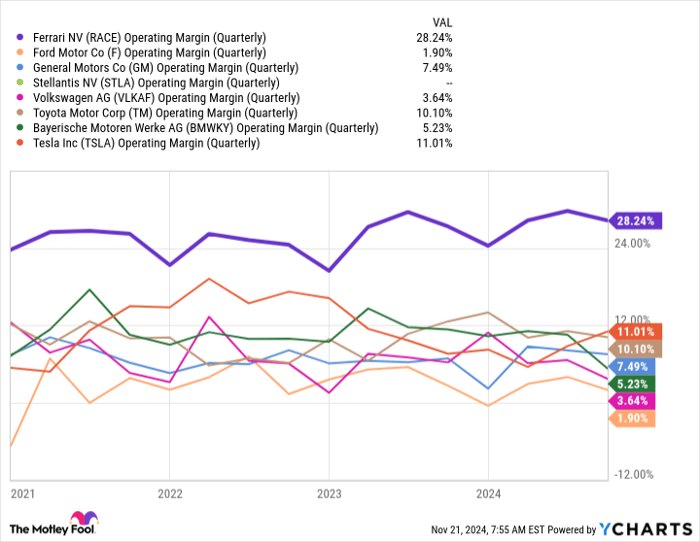Sometimes, when you zig and everyone else zags, you come out ahead in a big way. That's similar to what Lucid Group (NASDAQ: LCID) seems to be doing with its product pipeline strategy. At a time when most automakers are engaged in a race to the bottom -- offering affordable electric vehicle (EV) around $20,000 to $25,000 -- Lucid doesn't want much to do with that market.
In fact, two historically important types of vehicles won't be found in Lucid's product pipeline -- but should investors be concerned?
"That market sucks"
Lucid has turned in a strong three quarters of 2024 deliveries, with three consecutive company records. The young EV maker just started selling the Gravity SUV this month, its second vehicle after its initial luxury Air sedan, and it announced at least three upcoming midsize EVs, with production to start in late 2026.
But you won't find two historically important vehicles in its pipeline: a $20,000 entry-level vehicle, or any size of truck. In the past, one strategy used by automakers was to have a stair step of vehicle options. The hope was if they got you into their brand of vehicle early for cheap, they could keep you to buy a more expensive vehicle later -- or upsell you on a more premium sister brand.
It's a fine strategy, and automakers have worked it for decades. However, selling a high volume of affordable vehicles means thinner profit margins, if the vehicle is profitable at all. And according to Lucid's CEO, Peter Rawlinson, on a recent Wall Street Journal podcast: "That market sucks."
Lucid doesn't want to compete in the low-margin business down the road, and if I could pick a comparison to what Lucid wants to do, it's Ferrari. In fairness, it's a bit of a stretch, considering what Ferrari has accomplished and its different products. But Ferrari doesn't compete in the low-margin or truck business, and thanks to its iconic branding, vehicle technology, exclusivity, and pricing power, its operating margins absolutely dwarf mainstream and luxury competitors.
RACE Operating Margin (Quarterly) data by YCharts
While many EV companies are in a race to produce much more affordable EVs, Lucid could take another route to generate revenue from those mainstream markets by licensing some of its advanced EV technology to younger companies not wanting to develop it all on their own dime.
Why no truck?
Rawlinson is correct. Mainstream automakers live in a capital-intensive industry that dictates lower-margin business. This is why, historically, Detroit automakers have made their money with larger SUVs and trucks. The secret is that those larger gasoline-powered vehicles cost only slightly more to produce, and garner price tags two to three times higher than your average sedan.
Here's the kicker. That conventional wisdom of bigger vehicles generating bigger margins is flipped on its head in the EV industry. That's because the largest cost of an EV right now is the battery, and for a larger vehicle -- especially SUVs and trucks that tow -- the larger battery is a massive cost addition that makes producing trucks less compelling currently.
For a little additional context, during an event in September, Lucid Group showed in a presentation that an estimated cost of a battery pack with 300 miles of range at a typical pickup efficiency would require a 120 kWh battery and cost over $15,000. Need more range? It'll cost you; 375 miles at the same efficiency requires a 150 kWh battery pack that costs over $19,000.
What it all means
Entry-level products and full-size trucks have been a huge part of automotive industry history, but as Ferrari has shown, you don't always have to follow the crowd. It's also not as if Lucid isn't bringing its prices down. The company has already announced plans for at least three midsize electric vehicles, with production of at least one to start in late 2026 -- those vehicles are anticipated to check in with price tags around $50,000. That's enough of a price drop to expand its consumer base significantly.
At the end of the day, investors shouldn't panic about Lucid not having a historically dominant truck line, or an entry-level product to bring consumers into the brand. Lucid may have the EV technology, and eventually branding and pricing power, to drive a different path.
Should you invest $1,000 in Lucid Group right now?
Before you buy stock in Lucid Group, consider this:
The Motley Fool Stock Advisor analyst team just identified what they believe are the 10 best stocks for investors to buy now… and Lucid Group wasn’t one of them. The 10 stocks that made the cut could produce monster returns in the coming years.
Consider when Nvidia made this list on April 15, 2005... if you invested $1,000 at the time of our recommendation, you’d have $833,545!*
Stock Advisor provides investors with an easy-to-follow blueprint for success, including guidance on building a portfolio, regular updates from analysts, and two new stock picks each month. The Stock Advisor service has more than quadrupled the return of S&P 500 since 2002*.
*Stock Advisor returns as of November 25, 2024
Daniel Miller has positions in Ford Motor Company and General Motors. The Motley Fool has positions in and recommends Tesla. The Motley Fool recommends Bayerische Motoren Werke Aktiengesellschaft, General Motors, Stellantis, and Volkswagen Ag and recommends the following options: long January 2025 $25 calls on General Motors. The Motley Fool has a disclosure policy.
The views and opinions expressed herein are the views and opinions of the author and do not necessarily reflect those of Nasdaq, Inc.



